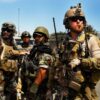ISBN 978-1682474485, Naval Institute Press 1st Edition, 2024, $34.95
Reviewed by: Harry J. Brodeen, Assistant Professor of Homeland Security, Embry-Riddle Aeronautical University, Daytona Beach, Florida, USA
In The Melting Point: High Command and War in the 21st Century, General (Ret.) Frank McKenzie offers a rare and candid examination of the complexities of American military leadership at the highest levels. Drawing on his experience as Commander of U.S. Central Command (CENTCOM) and a distinguished 42-year career in the United States Marine Corps, McKenzie delivers an indispensable guide for military officers and policymakers alike. His insights are steeped not only in extensive operational experience but also in his acute understanding of the evolving relationship between military and civilian leaders in modern America.
Having had the privilege of working for General McKenzie in 2012 during his tenure as the Director for Strategy, Plans, and Policy (J-5), I found this book particularly resonant. Even then, his strategic clarity, respect for civilian authority, and ability to navigate complex political environments were evident. The Melting Point captures these traits while offering an unvarnished look at the realities of command at the national level.
At its core, The Melting Point studies leadership under pressure. McKenzie discusses major decisions made during his time at CENTCOM, covering a broad spectrum of challenges ranging from the resurgence of ISIS to Iranian aggression to the final withdrawal from Afghanistan. His treatment of these topics is both meticulous and forthright. Readers expecting a sanitized recounting will be surprised by his willingness to respectfully critique the civilian leadership across three administrations while maintaining a tone that is neither vindictive nor partisan.
A particularly notable critique is McKenzie’s analysis of the Obama Administration’s Global Posture Review, an initiative heavily influenced by then-Vice President Joe Biden. McKenzie persuasively argues that the shift in focus toward China, while understandable in the context of emerging great-power competition, inadvertently weakened U.S. influence and operational effectiveness in the CENTCOM region. He connects these strategic recalibrations to the withdrawal from Iraq and the eventual collapse of the Afghan government, drawing prophetic parallels that underscore the consequences of premature disengagement.
McKenzie underscores the critical role of professional competence and the use of precise language in maintaining clarity and effectiveness in military and policy decision-making. He expresses concern over the decline in precise terminology across successive presidential administrations. He notes that the move away from traditional military terms such as “seize,” “destroy,” and “neutralize” contributed to a broader confusion of objectives. As he states in Chapter 10, “human talent available for service at the civilian appointee level was neither of the highest order nor very deep.” This observation reflects frustration with the caliber of civilian oversight and a deep concern for long-term policy effectiveness.
A significant portion of the book is dedicated to the concept of accountability, which is a cornerstone of military leadership. McKenzie does not shy away from describing the emotional and professional toll of appearing before Congress in the aftermath of the U.S. withdrawal from Afghanistan. Alongside Chairman of the Joint Chiefs of Staff General Mark Milley, McKenzie testified before both the Senate and House Armed Services Committees in September 2021. While no stranger to the rigors of congressional testimony, McKenzie notes that this experience was markedly different. The hearings were, in his words, “rife with partisanship and personal attacks,” reflecting a shift in tone that he found disheartening. He observed that “the personal vitriol was exceptional,” suggesting a growing disconnect between the military’s role in executing policy and the political environment responsible for shaping it.
Rather than deflect responsibility, McKenzie embraces it. He acknowledges the burden of command and the imperative of public accountability. Yet he also questions whether the structure of these hearings, dominated by political theater rather than substantive inquiry, serves the public or the military effectively. This is a sobering reminder that even the most experienced leaders are not immune to the corrosive effects of partisan polarization.
Throughout the book, General McKenzie reflects candidly on the consequences of high-stakes decisions, including those that resulted in the loss of life. Rather than deflecting responsibility, he confronts it directly, acknowledging the limitations of intelligence, the constraints of the operating environment, and the difficult trade-offs commanders must often make under pressure. He does not hide behind ambiguity or seek absolution but instead affirms the weight of command and the obligation to be accountable, even when outcomes are shaped by forces beyond his control. These reflections elevate the book beyond a memoir or strategic analysis. They offer a powerful meditation on duty, sacrifice, and the moral burden carried by those in senior leadership.
The title The Melting Point is well chosen. It suggests both the intense pressure commanders face and the point at which structures and assumptions can break down if not carefully managed. McKenzie’s candid accounts of decision-making during crisis moments, such as the strike against Iranian General Qasem Soleimani, reveal the enormous stakes and moral weight that accompany the highest levels of command. These passages are particularly compelling, offering the reader an intimate view into the confluence of political, strategic, and operational factors that shape American national security.
In addition to his expertise as a battlefield commander, General McKenzie demonstrates an exceptional ability to serve as a soldier-diplomat, a critical skill for modern military leaders operating at the highest levels. Throughout The Melting Point, he recounts numerous engagements with foreign leaders, coalition partners, and senior U.S. diplomats where his strategic acumen and interpersonal skills were as important as military strength. His ability to build trust, manage competing interests, and advance U.S. objectives without sacrificing long-term relationships reflects a sophisticated understanding of both hard and soft power. These accounts reveal a leader who recognizes that victory in today’s complex security environment often hinges as much on diplomacy as it does on firepower.
Stylistically, McKenzie’s writing is direct, organized, and accessible, making complex military and governmental processes understandable without sacrificing depth. His use of vignettes from his career, many of which are little known to the public, serves to humanize the often abstract world of national strategy. His reflections balance humility with authority, making it clear that he writes not to settle scores, but to share hard-earned lessons for those who will follow.
For current and aspiring military officers, The Melting Point should be considered required reading. It offers invaluable lessons in strategic thinking, the realities of operating within the U.S. interagency system, and the enduring challenges of balancing military advice with political directives. Civilian policymakers and diplomats would also benefit from McKenzie’s honest exploration of where and how gaps between military execution and political direction emerge, and the costs those gaps can impose.
In summary, The Melting Point is a powerful, thoughtful, and sometimes sobering look at the demands of command in the 21st century. General Frank McKenzie’s experience, intellect, and integrity shine through on every page. As someone who has witnessed his leadership firsthand, I can attest that the values he espouses in this book, respect for civilian authority, commitment to mission, and intellectual rigor, are not just theoretical ideals but principles he has consistently lived by. This work is a significant contribution to the study of American military leadership and a must-read for anyone seeking to understand the pressures and responsibilities of high command.








